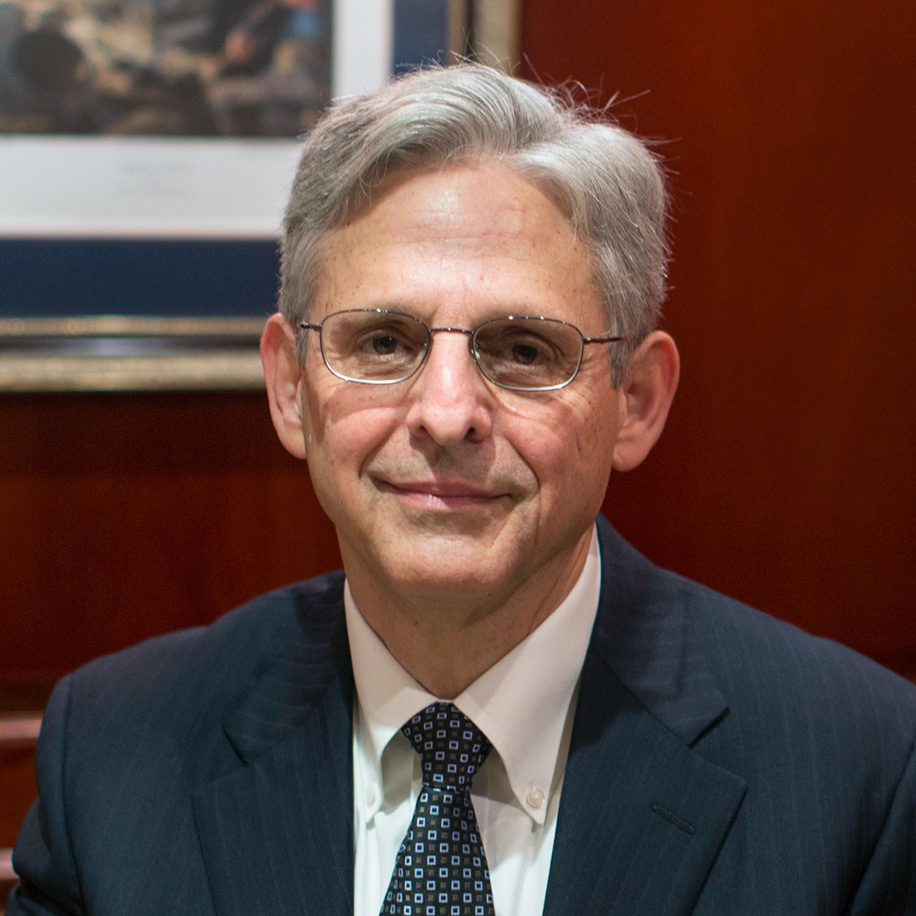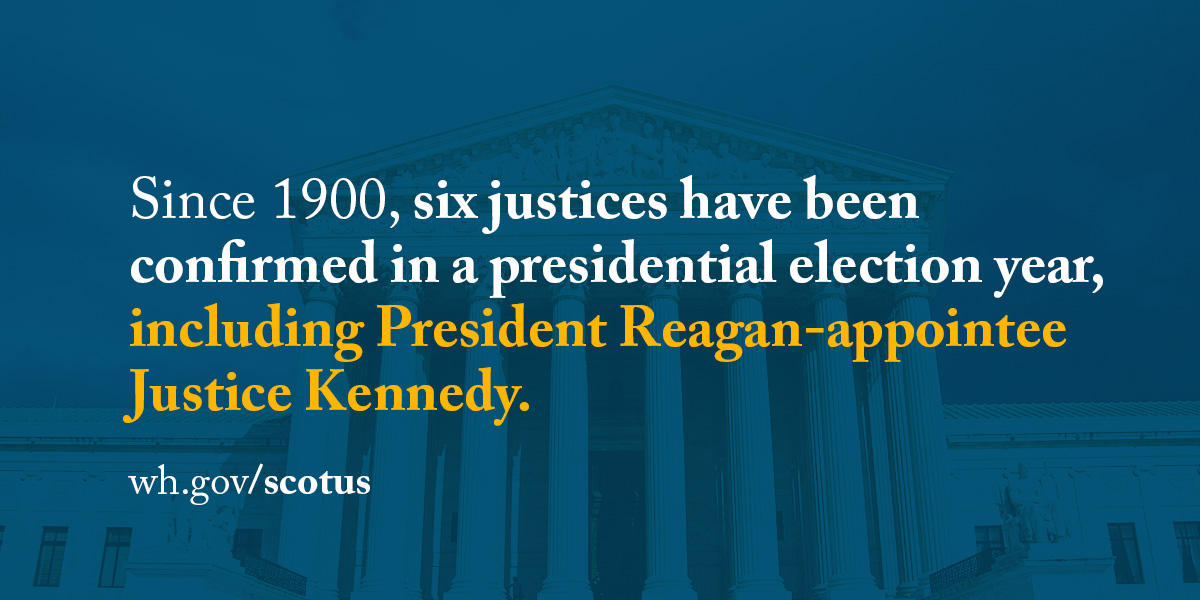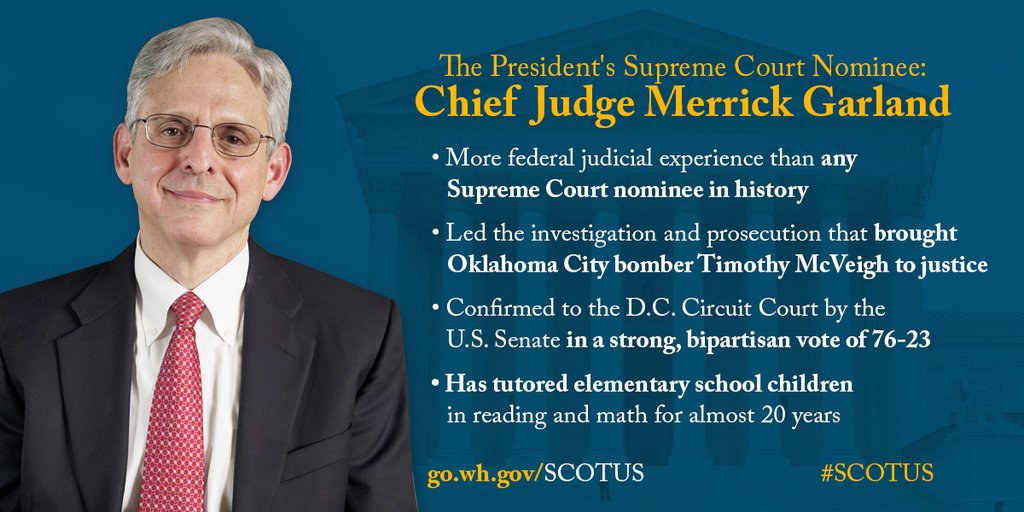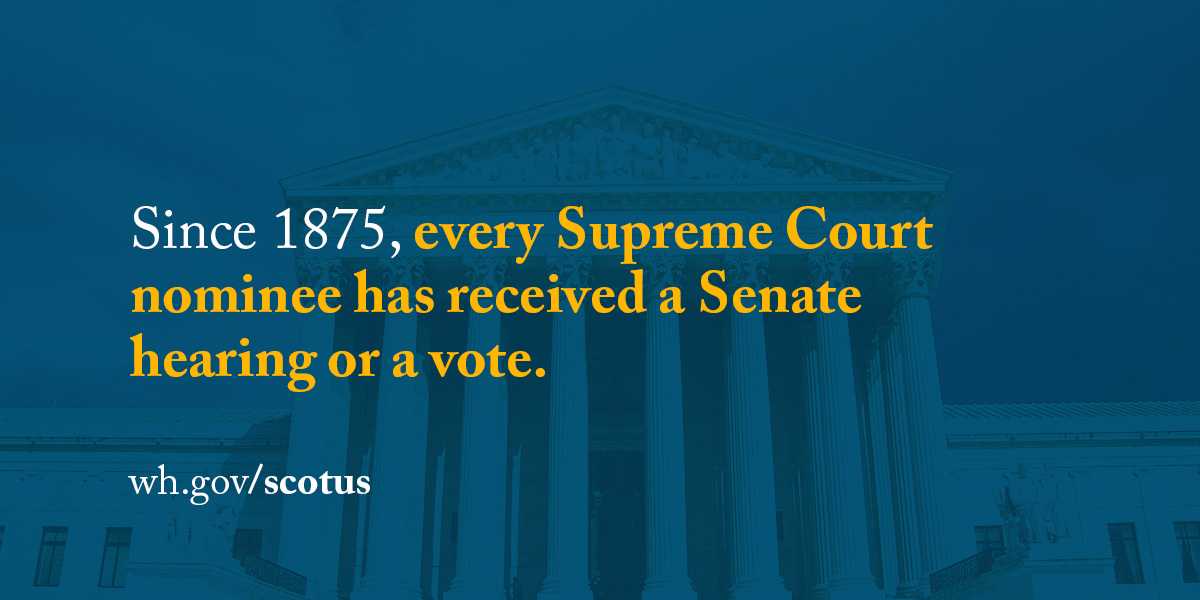SCOTUS Nomination - TEST
President Obama’s
Supreme Court Nomination
Professor Obama's Conversation on the Supreme Court
Sit in on President Obama's conversation with University of Chicago law students about the importance of the Supreme Court.

Current Position:
Chief Judge of the U.S. Court of Appeals for the District of Columbia
Years Federal Judiciary Experience:
18
Home state:
Illinois
The Honorable Merrick B. Garland
As Chief Judge of the most important federal appeals court in the nation, no one is more qualified to immediately serve on the Supreme Court than Merrick Garland.
A meticulous jurist with a record of forging consensus among judges across the ideological spectrum, he was confirmed to sit on the U.S. Court of Appeals in D.C. in 1997 with majority support from both parties in the U.S. Senate. Today, as Chief Judge of the D.C. Circuit, Judge Garland has more federal judicial experience than any Supreme Court nominee in history.
Here’s an overview of Chief Judge Garland’s record and credentials:
-
Oversaw some of the most important federal criminal cases in recent history, including the prosecutions of Timothy McVeigh and Terry Nichols for the Oklahoma City bombing as well as the government’s responses to the Unabomber and the Montana Freemen
-
Took steps as a government attorney to ensure proper respect for the rights of criminal defendants, helping develop policies that require prosecutors to conduct an individual assessment of each case when making charging decisions, rather than just charging with the most serious offense possible
-
Was confirmed to the D.C. Circuit in 1997 in a strong bipartisan vote of 76-23
-
Distinguished himself as a jurist who decides every case based on what the law requires
What They’ve Said
Conservative Voices
“Everybody is pretty much unanimous that by temperament, experience, and background, he is a very suitable person for the Supreme Court. The argument about the vacancy isn't entirely political.”
Miguel Estrada,
a conservative judicial nominee appointed by Pres. George W. Bush
“"[My] high opinion of Judge Garland has not changed — indeed, it has only strengthened...The qualities that I saw in Merrick Garland as a nominee to the D.C. Circuit have been displayed in abundance by Judge Garland as a member of that Court.”
Charles Cooper,
Lawyer for the National Rifle Association
Read the quote in context.
“I can hardly imagine how one could mount a personal attack against Judge Garland.”
Michael Chertoff,
Secretary of Homeland Security under Pres. George W. Bush
“We have never had the Senate deny a hearing to a nominee in the 100 years we’ve had hearings since Justice Brandeis was nominated in 1916. And it is absolutely outrageous. And the Senate needs to do its job and have a hearing and man up and vote as one of the Senators said the other day. And that’s what they need to do. That’s their job.”
Richard Painter,
Chief Ethics Lawyer for Pres. George W. Bush
Read the quote in context.
“Mr. Garland, at all times, demonstrated adherence to the highest traditions of the attorneys with the Department of Justice. He was uniformly courteous and considerate and demonstrated great skill, perseverance and learning.”
Stephen Jones,
Republican Attorney for Timothy McVeigh
3/16/16
“For what it’s worth, were I in the Senate I would vote to confirm Garland to the Supreme Court, but I’ve always supported the prompt consideration and confirmation of all qualified judicial nominees.”
Jonathan Adler,
conservative professor at Case Western University School of Law
3/16/16
“He's the best scenario we could hope for to bring the tension and the politics in the city down a notch for the summer.”
Carrie Severino,
Chief Counsel and Polity Director to the Judicial Crisis Network
Read the quote in context.
Legal Experts
“There is no principled or legitimate justification for the Senate Republicans to suddenly depart from this sensible and well-settled practice. Judges, lawyers, senators and scholars from across the political spectrum agree that Garland is exceptionally well-qualified, unquestionably ethical and reasonably moderate in his jurisprudence.”
Geoffrey Stone,
Law Professor at University of Chicago
3/28/16
“Like a tumor invading an otherwise healthy organ, the Senate majority party’s decision to withhold consideration of President Obama’s nominee to fill the seat of Justice Antonin Scalia, threatens to severely cripple the operations of the Supreme Court.”
James Nelson,
former Montana Supreme Court Justice
3/30/16
“He is an extraordinarily capable lawyer, in part because he is so good at finding common ground with his colleagues, which is one of the things that made him appeal to President Obama.”
Laurence Tribe,
Professor at Harvard Law
3/28/16
Leading Advocates
“Judge Garland earned high marks from law enforcement. He has been praised by those who worked at his side on criminal cases resulting from the bombing in Oklahoma City.”
Major Cities Chiefs of Police Association
“Judge Garland clearly has the academic and professional credentials to serve ably on the Supreme Court.”
Lambda Legal
“Merrick Garland is a highly qualified and widely respected jurist who is well-known for carefully deciding cases based on existing law, respect for precedent and the facts presented.”
American Federation of Teachers
“Judge Garland’s record on civil rights issues are impeccable but beyond his individual rulings it is clear he bases his decisions on the law and the protection of liberty and justice for all — which is exactly what we ask for in a Supreme Court justice.”
Rev. Al Sharpton
“Judge Garland is an intelligent, highly accomplished judge who has secured bipartisan support in his previous appointments.”
Cecile Richards,
President of Planned Parenthood Action Fund
“Judge Garland is the most well-prepared Supreme Court nominee in generations. From Supreme Court clerk, to the Justice Department, to the private sector, to overseeing the prosecutions of the Oklahoma City bombers, to Chief Judge of the D.C. Circuit, Garland has more federal judicial experience than any nominee in history.”
Wade Henderson,
Leadership Conference on Civil Rights and Human Rights
The Biography of the Honorable Merrick Garland
Born and raised in Illinois by a mother who served as a community volunteer and a father who ran a small business out of the family home, Chief Judge Garland was valedictorian of his public high school class. He won scholarships to attend Harvard University, where he graduated summa cum laude, and Harvard Law School, where he received his law degree magna cum laude and served on the Harvard Law Review. While in college, Garland worked a summer job as a shoe store stock clerk and sold his comic book collection to help pay his tuition. As a law student, he earned room and board by counseling undergraduates.
Following law school, he clerked for Supreme Court Justice William Brennan, who called him “a person of exceptional talent and great personal integrity” and “one of the best” clerks Brennan had.
Judge Garland has dedicated his life to serving the American people, taking on some of the most difficult anti-terrorism cases in our nation’s history. In the wake of the Oklahoma City bombing, he led the investigation and prosecution that ultimately brought Timothy McVeigh to justice.
As a mentor to his law clerks and a tutor to elementary school children, he is a dedicated and compassionate public servant who will conservatives and progressives praise for his rigorous intellect, his respect for the role of the judiciary, and his mastery of the law.
Chief Judge Garland and his wife of nearly 30 years, Lynn, have two daughters, Becky and Jessie. The family enjoys skiing, hiking, and canoeing, and together they have visited many of America’s national parks.

Chief Judge Garland on a family outing with his wife and two daughters.
“
The role of the court is to apply the law to the facts of the case before it — not to legislate, not to arrogate to itself the executive power, not to hand down advisory opinions on the issues of the day.
”
Chief Judge Merrick Garland
Read the FAQs
Q: Who was involved in the selection process?
A: Brian Deese, Senior Advisor to the President, and White House Counsel Neil Eggleston oversaw a broad process that involved other key members of the President’s team such as Valerie Jarrett, Senior Advisor to the President. Over the course of this past month, the White House consulted Senate leadership, other members of Congress, leaders of the bar, and a broad array of other stakeholders. But at the end of the day, it was the President who made this decision. Over the last month, he considered many excellent, highly qualified candidates with diverse backgrounds and varied life experiences. From those candidates, the President selected the person he believes is best for the job. That candidate is Chief Judge Garland.
Q: Has the President normally taken this much time to choose a Supreme Court nominee?
A: It has only been a month since Justice Scalia unexpectedly passed away. That is about as long as the President took to nominate his two previous nominees for the Supreme Court. The President has made clear he takes this process extremely seriously and wanted to balance his goal of moving swiftly with ensuring he nominated an excellent, highly qualified nominee. In that time, the President considered many qualified candidates with diverse backgrounds and varied life experiences. From those candidates, the President selected the person he believes is best for the job. That candidate is Chief Judge Garland.
In addition, over the last four decades, the US Senate has taken, on average, 67 days to confirm a President's nominee to the Supreme Court. It's currently mid-March. That means, there is ample time for the Senate to consider Judge Garland's nomination and confirm him to the Supreme Court before the next SCOTUS term starts at the beginning of October.
Q: Will Chief Judge Garland have a hearing in the Senate?
A: Now that the President has fulfilled his constitutional responsibility to nominate someone who is highly qualified to fill the vacancy on the Supreme Court, he looks forward to the Senate doing its job of holding a hearing and allowing members to vote on the nominee. That’s what is written in the Constitution and what the American people expect and deserve.
Q: Will Chief Judge Garland get confirmed?
A: Article II, Section 2 of the Constitution clearly spells out how the confirmation process is supposed to work. The President took that constitutional responsibility seriously, consulting with both Democratic and Republican Senators and even inviting them to put forward potential nominees for his consideration. The result of his consultations and rigorous process is the decision to nominate a thoughtful, meticulous, moderate judge for the Supreme Court with a keen ability for building consensus.
Chief Judge Merrick Garland was confirmed to the D.C. Circuit Court
The President fully expects Congress to honor their constitutional responsibility and allow this nominee a hearing and a vote. Despite repeated declarations that they will ignore such a responsibility, the President believes there will be enough Republicans listening to Americans and editorial boards across the country to honor their oath of office and do their job regardless of their party’s political leadership.
The Senate's Constitutional Responsibility to Act
The confirmation of a Supreme Court Justice is a solemn responsibility that the President and the Senate share under the U.S. Constitution.
Throughout history, members of both parties in Congress and in the White House have done their jobs so that the Judicial Branch can do its own. Failing to do so would be an unprecedented dereliction of duty.
The Senate has almost a full year to consider and confirm a nominee. In fact, since 1975, the average time from nomination to confirmation is 67 days. The longest time before confirmation in the past three decades was 99 days, for Justice Thomas, and the last four Justices, spanning two Administrations, were confirmed in an average of 75 days.
Here's a look at where President Obama's Supreme Court nominee stands in the confirmation process compared to those of recent nominees under three different administrations.
The Facts
Six Justices have been confirmed in a presidential election year since 1900.
For more than two centuries, it has been standard practice for Congress to confirm a president’s Supreme Court nominee, whether in a presidential election year or not. Of the six justices confirmed since 1900, three have been Republicans. The most recent Justice to be confirmed in an election year was Justice Kennedy — appointed by President Reagan — who was confirmed by a Democratic-controlled Congress in February of 1988.
Every nominee who was not withdrawn has received a vote within 125 days of nomination.
Since 1975, the average time from nomination to confirmation is 67 days. In fact, since 1875, every nominee who was not withdrawn has received a hearing or a vote. The longest time before confirmation in the past three decades was 99 days, for Justice Thomas, and the last four Justices, spanning two Administrations, were confirmed in an average of 75 days.
The Senate has almost a full year to consider and confirm a nominee.
It will be harmful and create unsustainable uncertainty if Congress fails to act on the President's nominee.
The Supreme Court could go the better part of two Terms with a vacancy if the Senate rejects its Constitutional responsibility. It'd be unprecedented for the Court to go that long with an empty seat. Here's why it's harmful:
The Court’s 4-4 decisions have no value in establishing precedent on which future decisions can rely. They also cannot establish uniform nationwide rules. That means if multiple courts ruled differently on an issue before it arose at the Supreme Court, a 4-4 ruling would leave those different rules in place in different states. The result is an unsustainable uncertainty — for the law, for individual liberties, and for our economy.
Spread the Word

Since 1900, six justices have been confirmed in a presidential election year, including President Reagan-appointee Justice Kennedy.

The President's Supreme Court Nominee, Chief Judge Merrick Garland: More federal experience than any Supreme Court nominee in history. Led the investigation and prosecution that brought Oklahoma City bomber Timothy McVeigh to justice. Confirmed to the D.C. Circuit Court by the U.C. Senate in a strong, bipartisan vote of 76-23. Has tutored elementary school children in reading and math for almost 20 years.
@SCOTUSNom
Follow this Twitter account to get the facts on President Obama's Supreme Court nominee and the nomination process.
